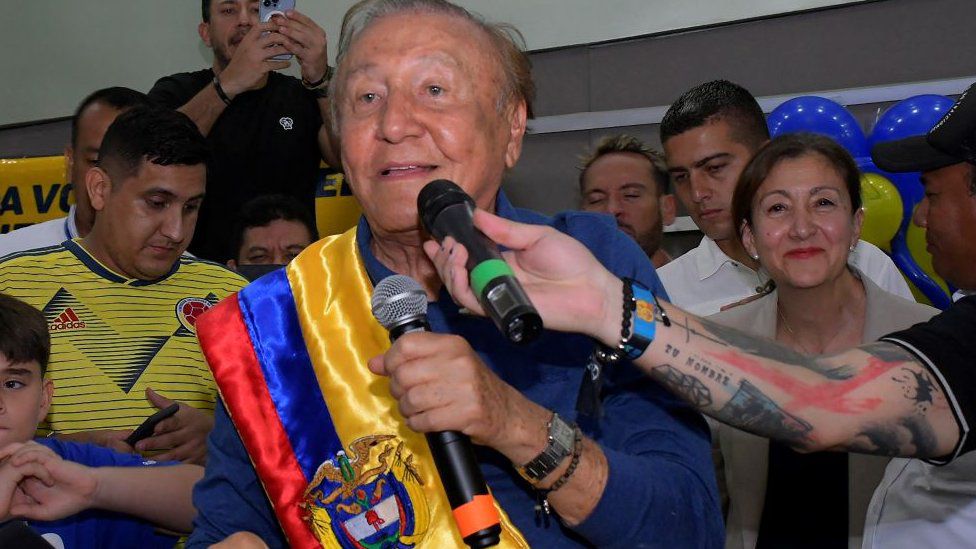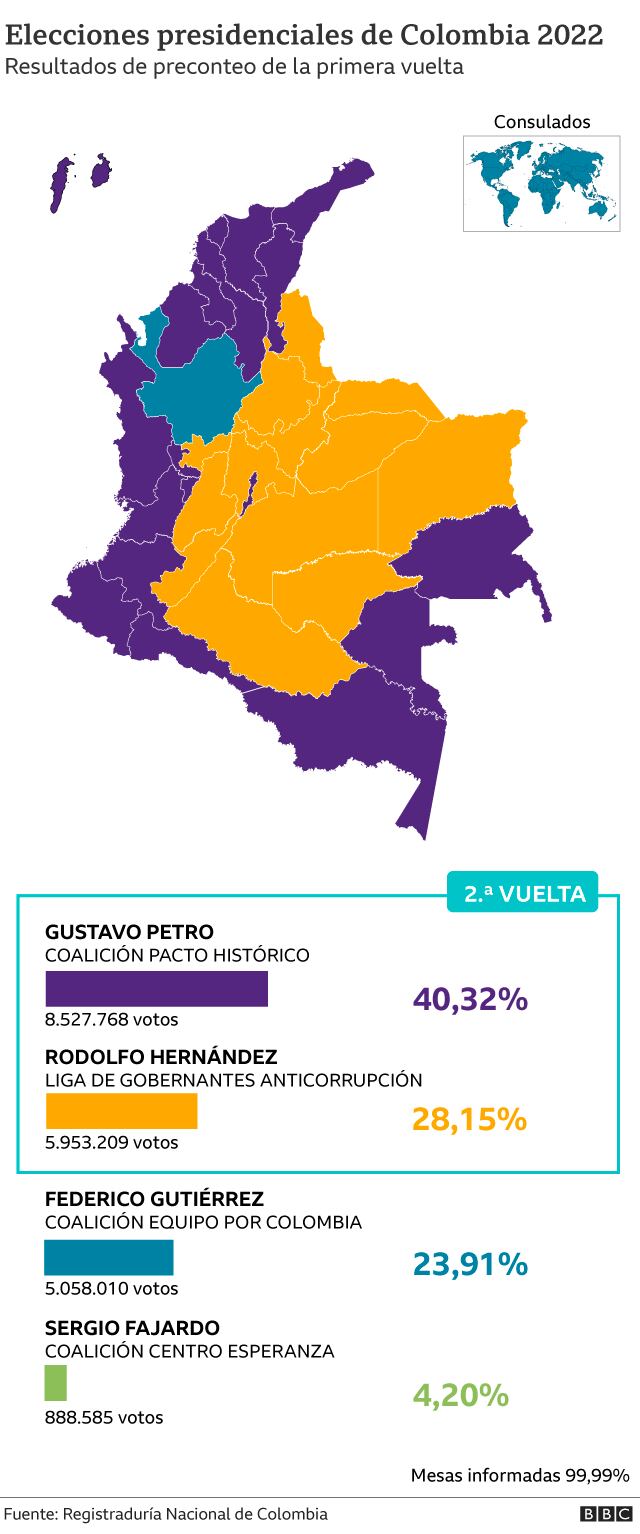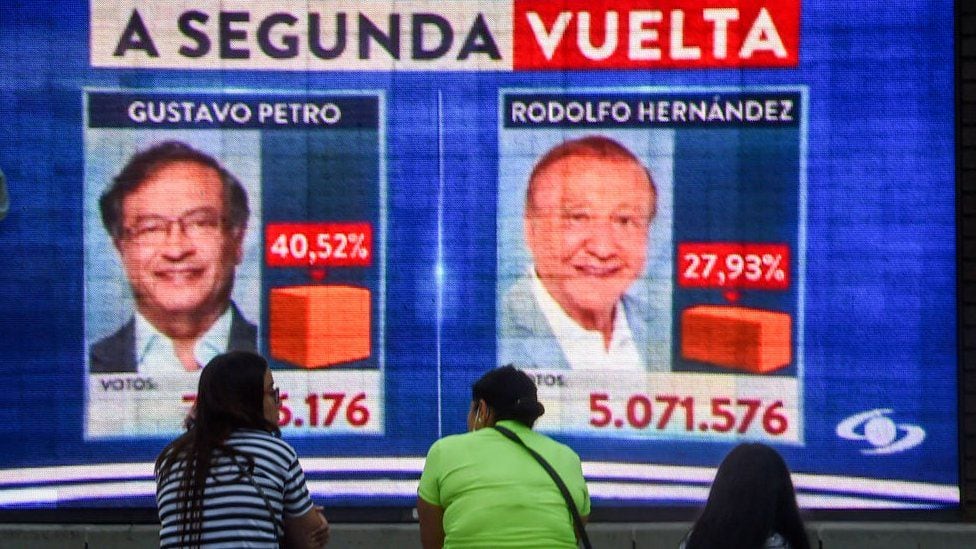Juanita León simply explains a presidential election in Colombia where everything seems strange and new: voters on Sunday chose the two options “for the biggest break with what was there,” he says.
LOOK: What Petro and Hernández need to win the second round and be presidents of Colombia
Director and founder of the empty chairan informative portal on Colombian politics, León warns, however, that for the June 19 ballot the leftist candidate Gustavo Petro (who had 40% of the vote) and the independent Rodolfo Hernández (28%) arouse fear as well as hope.
“Suddenly, one of the questions is who is less of a leap into the void,” reflects León in an interview with BBC Mundo.
Although he sees Hernández as a favorite, he considers that this controversial former mayor of Bucaramanga, unknown to many until recently, will be under the microscope in the three weeks that remain to define the successor of Iván Duque.
What follows is a summary of the telephone conversation with León, author of various books on journalism and Colombian politics:
What is the main conclusion of Sunday’s electoral result in Colombia?
The main conclusion is that the desire of Colombians to kick the board and their rejection of the establishment is very high.
The two proposals for the most extreme change and the biggest break with what was there were actually chosen.
The second conclusion is that Petro went from being almost president to having a hard time winning the presidency.
Can we talk about a favorite from now on?
Yes, I think Rodolfo is the favourite. Mathematically it seems to me that things are on his side.
The 5 million people who voted for Fico (Federico Gutiérrez, the right-wing candidate who came third) would be more inclined to vote for Rodolfo, because his vote was very anti-Petro and the Petristas dedicated themselves to mistreating all those who supported phyco.
Even if all of Fajardo’s votes (the center-left candidate who came fourth with 900,000 votes) went to Petro, it doesn’t work.
If you add Rodolfo’s votes plus Fico’s, he already won.
Of course there are three weeks left and Rodolfo has not been subjected to public scrutiny as Petro has been.
Things can still come out of Rodolfo, who seems to me to be a very ignorant person on state issues and has many opportunities to make mistakes in these three weeks.
Furthermore, an election is not a mathematical operation…
But it does express some ideological affinities.
Rodolfo won in all the departments that voted “No” in the plebiscite (of 2016 on the peace agreements), except Antioquia, Quindío and Risaralda.
If Rodolfo makes three more comments like the ones he has made in the past, about confusing Hitler with Einstein and not knowing where an apartment is, suddenly there are people who decide not to vote for him.
But I think that the anti-Petrism of the people who voted for Fico is very marked.
Another thing that favors Rodolfo is that on election day a third of Colombians still did not know him. And it has been seen that when they meet him they mostly like him. So he has a capacity for growth that Petro does not have because they already know him: they love him or they hate him.
He said that Sunday’s election expressed the desire of Colombians to “kick the board.” But will the second round be about who embodies that desire more or who offers more stability?
Petro is going to try to show himself as the candidate who offers the most stability to Colombia, which is still paradoxical: two weeks ago it was like shooting himself in the foot to elect him and now he is going to present himself as the safest change.
But it’s hard to sell it at all like that.
Rodolfo has an obsession with fiscal austerity, which for businessmen and the establishment is like a guarantee.

It will depend a bit on the teams, that the two can offer possible cabinets.
But most Colombians hate politicians and Rodolfo embodies that change. Petro’s changes are more in the economic model; those of Rodolfo are more into politics and are more attractive.
But Rodolfo is not backed by an ideology, he does not have a team, it is a project rooted in his own personality. He is also a person who admires (the president of El Salvador, Nayib) Bukele, that one does not know if tomorrow he ends up closing Congress.
Does this mean that the two candidates who could be the next president of Colombia generate fear in some part of society?
Yes, in one part of society they generate a lot of fear and in another a lot of illusion.
How much does the fact that there has never been a left-wing president in Colombia now weigh or help Petro?
I don’t think it will help him with more people than the 8.5 million who already voted for him. Colombians in general are more to the right than to the left, more conservative, believe more in the market…
Petro has already broken the historical ceiling of the left, but I think that in Colombia being on the left is not something totally attractive.
Does being a former guerrilla also weigh on Petro? Or is it something that happened a long time ago and has no influence?
I think that doesn’t matter. Petro has shown for 30 years that he acts within the law and he really laid down his arms.

He was a wonderful senator, I don’t think anyone sees him as a guerrilla anymore.
The example of Venezuela does matter, that people are very scared, or his ideas are so radical, or that the people around him have so decisively supported the protests and vandalism.
And in what does Hernández generate fear?
I think Hernández generates fear in some of the statements he has given. He is a very uninstitutional person, so he feels proud of having hit a councilman, for every three words he says two are rude, he says he admires Bukele, that he is going to issue a state of siege decree as soon as he takes office to get the laws you want…
Some people like the fact that it is so non-institutional, but the most sophisticated people are concerned. And since he doesn’t have an ideological backing, but rather everything depends on his temperament, that’s worrying.
Now, in his mayor’s office he appointed a whole good technocracy. It’s like he recognizes what he doesn’t know and listens and delegates to those who do know.
That can be a guarantee, but at the same time he is a confrontational person who leads by humiliating people. It is very politically incorrect in its ways and in Colombia we are not used to that.
On moral issues he is a liberal person. He raised the gay flag when gay couples were approved for adoption. He is in favor of decriminalizing abortion. So he’s also not a Trump in the conservative sense.
And what about gender issues?
It seems to me that in terms of gender, the part that they are taking out in which he said that the wife should stay at home, it seems to me that the Petristas decontextualized it a lot.
What he says is that the first lady should not get involved in government affairs, which seems perfect to me.

It seems to me that he is a 78-year-old man and he thinks like a 78-year-old man on these issues. But I didn’t see that his mayor’s office had misogynistic things. There are more episodes of misogynism in Petro than in him.
In addition to his controversial statements and attacks, Hernández is pending criminal proceedings for alleged irregularities committed when he was mayor of Bucaramanga…
I think that’s his biggest Achilles heel. He has a criminal investigation and is accused of a corruption case.
the empty chair he thoroughly investigated it and there are too many indications that he did commit at least serious irregularities in favor of his son.
That accusation will be decided after the president has been elected, with which (if Hernández wins the second round) he would be protected by a jurisdiction, it would remain in the hands of the accusations commission of the House of Representatives and Congress would have a giant pressure tool on him.
He wields an entire anti-corruption flag, in Bucaramanga he did fight corruption a lot, but he is accused of a crime of corruption.
Another striking thing is that both candidates have been accused by their critics of having an authoritarian style. So some wonder if Colombians are looking for a strong man for the presidency…
I think the Colombians really wanted to kick the board. And both are quite authoritarian, they are very disrespectful of the press, of the other powers… In their defects they are very similar.
Until the first round the question was the fear generated by Petro. But, how much can the factor of fear of Hernández influence now? Is it a second round on the candidate that generates less fear?
I am not sure. I feel like the campaign up to this point was about Petro. It wasn’t even about change or continuity, it was about Petro.
And now yes, suddenly, one of the questions is who is less than a leap into the void.
Source: Elcomercio
I, Ronald Payne, am a journalist and author who dedicated his life to telling the stories that need to be said. I have over 7 years of experience as a reporter and editor, covering everything from politics to business to crime.

:quality(75)/cloudfront-us-east-1.images.arcpublishing.com/elcomercio/GIYDCMRNGA2S2MZRKQYDAORSGA.jpg)





